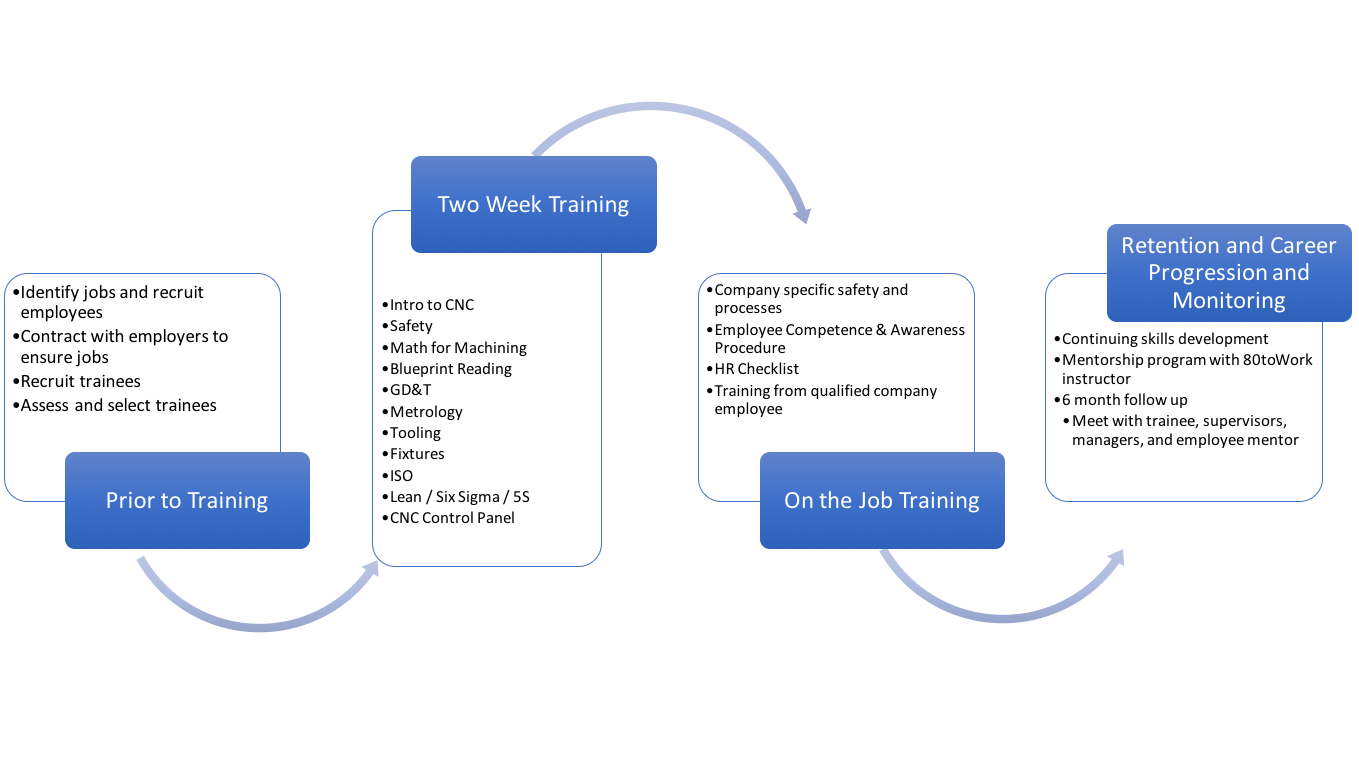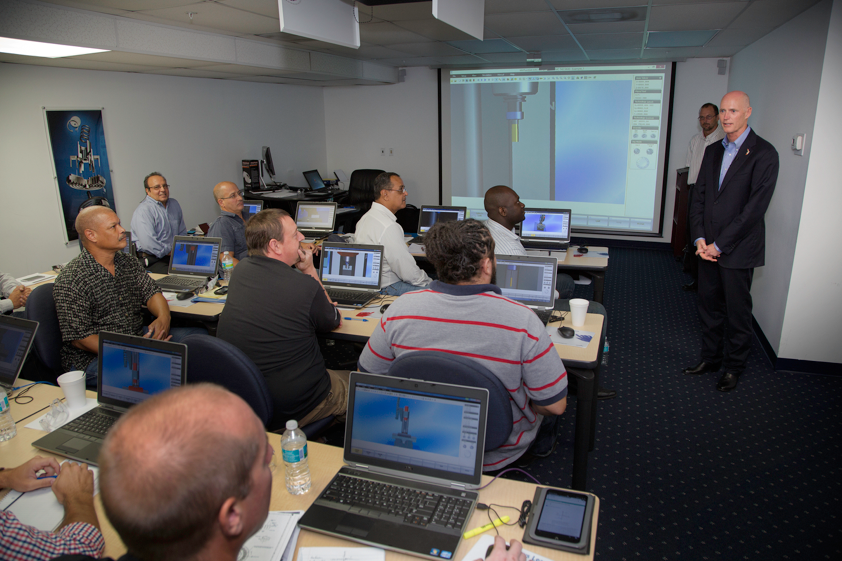MTS NEW HIRE "80 TO WORK™" SKILLS TRAINING PROGRAM
The 80 to Work™ program is an accelerated, high intensity training designed to deliver results. The 80 to Work™ program provides companies with an employee that has undergone rigorous training, proven test results, and a willingness to perform at a high level. This fast-track, intense training, using MTS Interactive and MTS Simulation is designed to produce Level “C” machinists who can quickly contribute to production capacity.
The training program is customized to the type of CNC equipment being used, company specific practices, company specific drawings, etc. by the hiring company. The training program also includes a six (6) month mentoring phase where MTS continues to mentor the trainee to insure retention and progression within their job classification. Should the employee change work assignments, (e.g. move from setting up lathes to setting up mills), the skills training would be customized for this new job classification. At the conclusion of the six month training program, trainees are expected to have the skills of a Level “B” machinist.
Upon completion of 240 hours of skills training (including the 80 hours of training provided by 80 to Work™) the student is qualified to test for the IHK CNC Production Specialist Certification. This IHK Certification is recognized worldwide as the gold standard of CNC certifications.
80 to Work™ Process

The image above shows an overview of the 80 to Work™ program and how a student would progress through the program.
Prior to Training
Prior to training, specific jobs are identified based on the company’s needs. For example, a company may need 15 machine operators so during the process of finding potential employees, those with an aptitude for operating a machine will be emphasized.
After the specific jobs and needs of the company have been established, a pool of candidates is created. From this pool we perform interviews, background tests, drug tests, and identify those candidates that fit in well with the company and their future role at the company. We work closely with the company’s HR department and supervisors throughout this process.
Once the candidates have been identified to accommodate the company’s needs, the potential students will go through the ACT WorkKeys Readiness assessments to confirm that they have necessary skills for the program.
Once the final candidates have been selected for the program, the two-week training program can begin.
Training Period
On the first day of the 80-hour training program, students will learn what they are training for, what they can expect when they are on the job, and what is to be expected from them; both during the training program and throughout their employment with the company.
During the two weeks of training, if a student is tardy more than once they are immediately terminated from the program. If the student misses a day of training without a legitimate reason, they are immediately terminated from the program. This sets the standard high for the students so that they understand the importance of being a good employee and what the company expects from them as employees.
Throughout the 80-hour program, the students will learn the following subjects:
- Intro to CNC
- Safety
- Math for Machining
- Reading Blueprints
- Geometric Dimensioning and Tolerancing (GD&T)
- Metrology
- Tooling
- Fixtures
- ISO Standards
- Lean / Six Sigma /5S
- CNC Control Panel

During the two-week program, students should go on at least one, but preferably two, plant tours at the company they will be working on. This allows the students to see what they are learning in action on the shop floor, as well as provides them with the experience of seeing what the shop floor looks like in production mode so that they are prepared for when they actually begin employment.
While students will not master any of the above subjects during the 80 hour program, they won’t be “green” to these subjects and will have the fundamental knowledge of these subjects so that they can continue learning them throughout their career. Essentially, the 80 to Work™ program creates the fundamental, foundational skills necessary for an individual to be a successful employee and provides the opportunity for the students to continue their education while employed so that they might climb the manufacturing career ladder.
On the Job Training (OJT)
After successful completion of the 80 to Work™ program, students will then be hired by the company and go through any company specific safety trainings, process trainings, site trainings, etc. depending on the company.
Typically, for the first few weeks of employment, students will job shadow a qualified employee who performs a similar role to what the student will be doing. This allows the student to become familiar with what they will be doing while at the same time having someone showing them these tasks and correcting any mistakes
This is one of the most critical points in the training and it is recommended that the employee providing OJT is a well-qualified employee who has good work ethic, keeps a clean workspace, etc. so that the student does not pick up any bad habits. Typically, a student will mimic and learn all of the things that their mentor does, good or bad.
For six months after the student is hired by the company, they will retain access to any e-learning course materials so that they can practice and continue to learn while they are working. Additional resources may also be provided depending on the job position, such as a quality control position.
Career Progression and Mentoring
One of the key elements to the 80 to Work™ program is the six-month mentorship and follow-up with the students. This allows the student access to outside information and counseling. This provides a communication channel between the student, the employer, and the teacher.
Throughout the six-month mentorship, if the student’s job role were to change, for example, if a student starts at the company as a machine operator and then they move to the quality department, the student will be able to learn skills related to quality and will receive additional training materials because of the change in position.
SUPPORTED BY LOCAL WORKFORCES
The "80 to Work™" training program has been supported by local Workforce boards and has qualified for a tuition reimbursement for up to 50% of the training cost. Hoerbiger Corporation of America, Inc. (HCA) in Broward County was one of the first companies to take advantage of a WorkForce One grant and participate in the "80 to Work" training program. As Hannes Hunscholfsky, HCA's Executive Vice President Global Operations said in his press release on the success of the program, "We are now in a position, utilizing this unique training program, to grow our own machinists expeditiously. We were looking for Level A and B machinists and now can grow our own form out Level C machinists."
For more information on the 80 to Work™ program please contact MTS.

